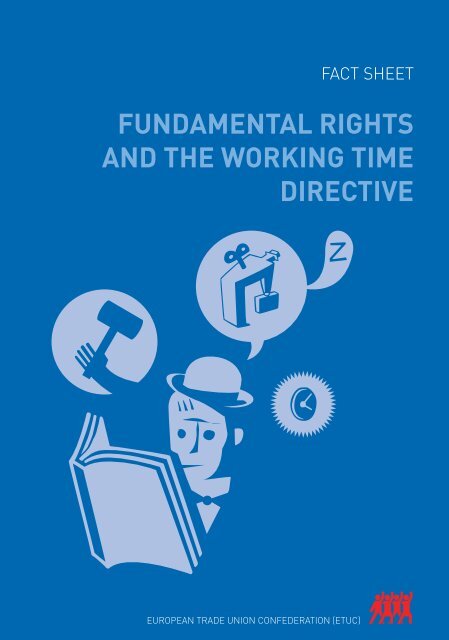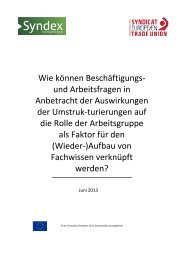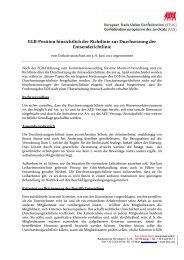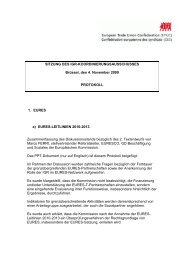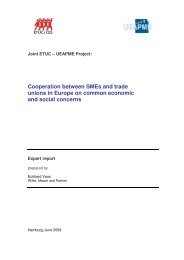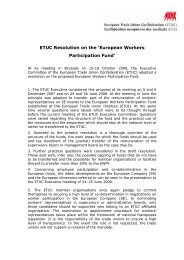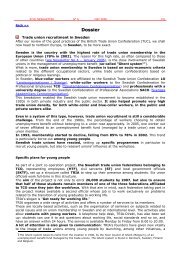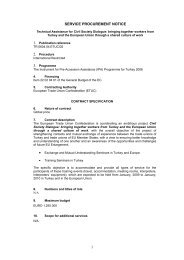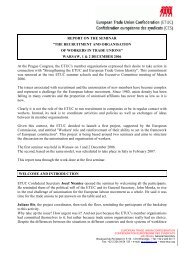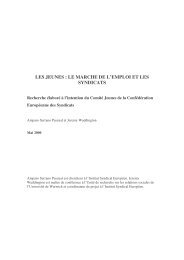fundamental rights and the working time directive - ETUC
fundamental rights and the working time directive - ETUC
fundamental rights and the working time directive - ETUC
Create successful ePaper yourself
Turn your PDF publications into a flip-book with our unique Google optimized e-Paper software.
FACT SHEET<br />
FUNDAMENTAL RIGHTS<br />
AND THE WORKING TIME<br />
DIRECTIVE<br />
EUROPEAN TRADE UNION CONFEDERATION (<strong>ETUC</strong>)
01 Fundamental <strong>rights</strong> on <strong>working</strong> <strong>time</strong> .............................................. 3<br />
02 The Working Time Directive (WTD) ................................................... 6<br />
03 Revision of <strong>the</strong> WTD .......................................................................... 8<br />
04 Commission Communication on a new “review”<br />
of <strong>the</strong> WTD: first <strong>and</strong> second stage consultations<br />
<strong>and</strong> <strong>ETUC</strong> reaction ............................................................................ 13<br />
EUROPEAN TRADE UNION CONFEDERATION (<strong>ETUC</strong>)<br />
FACT SHEET<br />
FUNDAMENTAL RIGHTS<br />
AND THE WORKING TIME<br />
DIRECTIVE
2<br />
The Charter of Fundamental Rights guarantees all workers <strong>the</strong> right to limi-<br />
tation of <strong>the</strong>ir <strong>working</strong> hours <strong>and</strong> protection against <strong>the</strong> health <strong>and</strong> safety<br />
risks of long <strong>and</strong> irregular hours of work. This provision is incompatible<br />
with individual opt-outs <strong>and</strong> o<strong>the</strong>r exclusions from <strong>working</strong> <strong>time</strong> protection.<br />
The EU Treaties stipulate that social policies should be developed to im-<br />
prove <strong>the</strong> living <strong>and</strong> <strong>working</strong> conditions of European workers <strong>and</strong> citizens.<br />
This provision is incompatible with proposals to weaken existing st<strong>and</strong>ards.<br />
Questions linked to <strong>working</strong> <strong>time</strong> are <strong>fundamental</strong> to trade unions <strong>and</strong> our<br />
society, <strong>and</strong> lie at <strong>the</strong> heart of Social Europe. Safeguarding <strong>the</strong> health <strong>and</strong><br />
safety of workers, as well as that of third parties, <strong>and</strong> allowing <strong>working</strong> peo-<br />
ple to reconcile private <strong>and</strong> professional life is crucial to <strong>the</strong> interests of<br />
workers, societies <strong>and</strong> economies.
FUNDAMENTAL RIGHTS<br />
ON WORKING TIME<br />
01<br />
Working <strong>time</strong> is a <strong>fundamental</strong> right enshrined in European <strong>and</strong><br />
international law. In <strong>the</strong> European Union <strong>the</strong>se <strong>fundamental</strong> <strong>rights</strong><br />
have been enshrined in <strong>the</strong> Charter of Fundamental Rights <strong>and</strong> in<br />
<strong>the</strong> Treaties:<br />
» The Charter of Fundamental Rights became legally binding<br />
following <strong>the</strong> entry into force of <strong>the</strong> Lisbon Treaty. Article 31<br />
of <strong>the</strong> Charter deals with ‘fair <strong>and</strong> just <strong>working</strong> conditions’,<br />
<strong>and</strong> specifies that “every worker has <strong>the</strong> right to <strong>working</strong><br />
conditions which respect his or her health, safety <strong>and</strong> dignity”.<br />
It adds that “every worker has <strong>the</strong> right to limitation of<br />
maximum <strong>working</strong> hours, to daily <strong>and</strong> weekly rest <strong>and</strong> to an<br />
annual period of paid leave”.<br />
» The Treaty has specified that <strong>the</strong> European Union <strong>and</strong> <strong>the</strong><br />
Member States shall have as <strong>the</strong>ir objective “<strong>the</strong> promotion of<br />
employment, improved living <strong>and</strong> <strong>working</strong> conditions, so as<br />
to make possible <strong>the</strong>ir harmonisation, while <strong>the</strong> improvement<br />
is being maintained” (Article 151). This also translates into<br />
<strong>the</strong> duty to progressively reduce long <strong>working</strong> hours, while<br />
improvements are maintained.<br />
» International st<strong>and</strong>ards on <strong>the</strong> regulation of <strong>working</strong> <strong>time</strong><br />
include <strong>the</strong> preamble to <strong>the</strong> ILO Constitution that created <strong>the</strong><br />
International Labour Organisation in 1919. This covers <strong>the</strong><br />
“regulation of <strong>the</strong> hours of work, including <strong>the</strong> establishment<br />
3
4<br />
of a maximum <strong>working</strong> day <strong>and</strong> week” of an eight hour day<br />
<strong>and</strong> a 48 hour <strong>working</strong> week 1 . There are thirty-nine different<br />
ILO st<strong>and</strong>ards that impact on <strong>working</strong> <strong>time</strong>, covering daily <strong>and</strong><br />
weekly <strong>working</strong> <strong>time</strong> (eight hour day, 40 hour week), weekly<br />
rest period of a minimum of 24 hours, a minimum entitlement<br />
to three weeks annual leave, as well as st<strong>and</strong>ards on night work,<br />
part-<strong>time</strong> work <strong>and</strong> workers with family responsibilities.<br />
» The Council of Europe’s 1961 European Social Charter (as<br />
well as <strong>the</strong> revised Charter 1996) also established in Art.2 <strong>the</strong><br />
goal of reduced <strong>working</strong> hours requiring Member States to<br />
ensure “reasonable daily <strong>and</strong> weekly <strong>working</strong> hours” <strong>and</strong> <strong>the</strong><br />
progressive reduction in <strong>the</strong> length of <strong>the</strong> <strong>working</strong> week.<br />
Despite <strong>working</strong> <strong>time</strong> being a <strong>fundamental</strong> right, <strong>the</strong> <strong>ETUC</strong> has been<br />
highly concerned about <strong>the</strong> consistent attempts by <strong>the</strong> European Com-<br />
mission to reduce <strong>the</strong>se <strong>fundamental</strong> <strong>rights</strong> under <strong>the</strong> revision of <strong>the</strong><br />
Working Time Directive (WTD).<br />
1 In 1919 <strong>the</strong> ILO first set <strong>the</strong> eight-hour <strong>working</strong> day <strong>and</strong> 48-hour week for industrial<br />
workers, in <strong>the</strong> ILO Convention No. 1 on Hours of Work (Industry). In 1930 Convention<br />
No 30 extended <strong>the</strong> principle of an eight-hour day <strong>and</strong> 48 hour <strong>working</strong> week to<br />
those <strong>working</strong> in <strong>the</strong> commercial <strong>and</strong> office sectors of <strong>the</strong> economy.
A strong WTD is even more relevant today in light of <strong>the</strong> significant<br />
changes that have occurred in <strong>the</strong> workplace, in <strong>the</strong> organisation of<br />
work <strong>and</strong> societal changes. For this reason Europe requires a modern<br />
organisation of work <strong>and</strong> <strong>working</strong> <strong>time</strong> that meets workers’ needs for<br />
healthy <strong>working</strong> hours, a better work-life balance <strong>and</strong> decent wages.<br />
These are crucial to achieving <strong>the</strong> EU’s goals of more <strong>and</strong> better employ-<br />
ment, competitiveness <strong>and</strong> gender equality, <strong>and</strong> to enable Europe to<br />
respond to <strong>the</strong> challenges resulting from <strong>the</strong> economic crisis, demo-<br />
graphic ageing <strong>and</strong> global competition.<br />
5
6<br />
THE WORKING TIME DIRECTIVE<br />
(WTD)<br />
2<br />
The WTD establishes minimum health <strong>and</strong> safety requirements on<br />
<strong>working</strong> <strong>time</strong>. The original Directive 93/104/EC, adopted in 1993, was<br />
amended in 2000 by Directive 2000/34/EC <strong>and</strong> <strong>the</strong> two have now been<br />
consolidated into Directive 2003/88/EC 1 .<br />
The Preamble to <strong>the</strong> WTD states that “The improvement of workers’<br />
safety <strong>and</strong> health at work is an objective which should not be subordi-<br />
nated to purely economic considerations”.<br />
The Directive covers:<br />
» Maximum weekly <strong>working</strong> <strong>time</strong> of 48 hours on average,<br />
including over<strong>time</strong><br />
» Minimum of four weeks paid annual leave<br />
» A rest break if <strong>the</strong> <strong>working</strong> day is longer than six hours<br />
» Minimum rest period of 11 consecutive hours in each 24 hours<br />
period, Minimum uninterrupted rest period of 24 hours plus <strong>the</strong><br />
11 hours’ daily rest<br />
» A maximum of eight hours’ night work, on average, in each<br />
24 hours period<br />
1 Council Directive 93/104/EC of 23 November 1993 concerning certain aspects of <strong>the</strong><br />
organisation of <strong>working</strong> <strong>time</strong> <strong>and</strong> Council Directive 2003/88/EC of 4 November 2003<br />
concerning certain aspects of <strong>the</strong> organisation of <strong>working</strong> <strong>time</strong>.
The minimum requirements of <strong>the</strong> WTD are binding for all Member<br />
States of <strong>the</strong> EU <strong>and</strong> are important in preventing employers from get-<br />
ting a competitive advantage by putting pressure on workers to accept<br />
long <strong>and</strong> irregular <strong>working</strong> hours. The current Directive is already very<br />
flexible <strong>and</strong> establishes a maximum 48-hour <strong>working</strong> week, but per-<br />
mits <strong>working</strong> <strong>time</strong> to be averaged out over four months, thus allowing<br />
<strong>working</strong> weeks of more than 48 hours to be compensated by shorter<br />
<strong>working</strong> weeks.<br />
In addition, <strong>the</strong> WTD includes two far-reaching derogations, allowing<br />
for almost unlimited extension of <strong>working</strong> hours.<br />
» First, <strong>the</strong> four-month reference period can be extended to<br />
one year, but only in specific cases, on <strong>the</strong> basis of collective<br />
agreements.<br />
» Second, Member States are allowed not to apply <strong>the</strong><br />
maximum 48-hour limit at all, on <strong>the</strong> basis of voluntary<br />
agreements with individual workers: <strong>the</strong> so-called ‘opt-out’.<br />
The Commission was under a legal obligation to re-examine<br />
<strong>the</strong> latter within seven years of <strong>the</strong> <strong>directive</strong>’s implementation<br />
in November 2003. Since <strong>the</strong>n <strong>the</strong> <strong>ETUC</strong> has dem<strong>and</strong>ed <strong>the</strong><br />
deletion of <strong>the</strong> individual opt-out, in line with <strong>the</strong> Treaty<br />
obligation to limit maximum <strong>working</strong> hours for all workers<br />
in <strong>the</strong> EU.<br />
7
8<br />
REVISION OF THE WTD<br />
3<br />
Attempts by <strong>the</strong> European Commission to revise <strong>the</strong> Working Time<br />
Directive date back to 22 September 2004, when <strong>the</strong> Commission made<br />
a proposal to include <strong>the</strong> individual ‘opt out’ clause in <strong>the</strong> main Directive<br />
<strong>and</strong> to address <strong>the</strong> issue of on-call <strong>time</strong>, following ECJ judgements<br />
on <strong>the</strong> issue (see box below). Following several years of deadlock, a<br />
common position on <strong>the</strong> Directive was agreed by <strong>the</strong> Member States<br />
in 2008 in <strong>the</strong> Employment, Social Policy, Health <strong>and</strong> Consumer Affairs<br />
Council (EPSCO). The June 2008 Council Agreement contained three<br />
main proposals:<br />
» To keep <strong>the</strong> individual ‘opt-out’ in <strong>the</strong> Directive, enabling<br />
employers to agree with individual workers <strong>working</strong> hours<br />
beyond <strong>the</strong> maximum <strong>working</strong> hours of 40 hours a week<br />
in <strong>the</strong> Directive. In particular, <strong>the</strong> ‘opt out’ clause had<br />
been promoted by <strong>the</strong> UK along with a number of o<strong>the</strong>r<br />
Member States.<br />
» To define so-called inactive parts of on-call duty as not being<br />
<strong>working</strong> <strong>time</strong>, even when <strong>the</strong> worker has to be available in<br />
<strong>the</strong> workplace. This was on <strong>the</strong> basis that on-call <strong>working</strong> <strong>time</strong><br />
would be divided into ‘active’ <strong>and</strong> ‘inactive’ periods<br />
» To extend <strong>the</strong> reference period for counting <strong>the</strong> average<br />
maximum <strong>working</strong> week of 48 hours from four to 12 months,<br />
without any reference to proper safeguard provisions, such as<br />
collective agreements
At <strong>the</strong> <strong>time</strong>, <strong>and</strong> since <strong>the</strong>n, <strong>the</strong> <strong>ETUC</strong> has argued that <strong>the</strong>se provisions<br />
are regressive <strong>and</strong> undermine <strong>working</strong> conditions <strong>and</strong> trade union<br />
<strong>rights</strong> to collective bargaining.<br />
The 2008 position of <strong>the</strong> Council had not taken into account any of <strong>the</strong><br />
proposals made by <strong>the</strong> European Parliament in its first reading. This led<br />
<strong>the</strong> European Parliament, in <strong>the</strong> second reading in 2008 to reject <strong>the</strong><br />
common position of <strong>the</strong> Member States. This resulted in deadlock, par-<br />
ticularly regarding <strong>the</strong> ‘opt out’ <strong>and</strong> ‘on call’ <strong>working</strong> <strong>time</strong>, with <strong>the</strong><br />
European Commission <strong>and</strong> <strong>the</strong> European Parliament holding diametri-<br />
cally opposed positions. The Working Time Directive was referred to a<br />
conciliation committee in early 2009 under <strong>the</strong> co-decision procedure<br />
between <strong>the</strong> Council <strong>and</strong> <strong>the</strong> Parliament. However, this was unsuccess-<br />
ful <strong>and</strong> <strong>the</strong> deadlock remained.<br />
On-call: <strong>the</strong> SIMAP, Jaeger, Pfeiffer, <strong>and</strong> Dellas cases in<br />
<strong>the</strong> European Court of Justice (ECJ)<br />
Those judgements have been important in defining on-call work as work-<br />
ing <strong>time</strong>. In <strong>the</strong> SIMAP, Jaeger <strong>and</strong> Pfeiffer cases <strong>the</strong> ECJ ruled that ‘on-call<br />
<strong>working</strong> <strong>time</strong>’ i.e. when <strong>the</strong> employee must be available in <strong>the</strong> workplace<br />
must be defined as <strong>working</strong> <strong>time</strong> under <strong>the</strong> Directive. Fur<strong>the</strong>rmore compen-<br />
satory rest <strong>time</strong> must be taken immediately after <strong>the</strong> <strong>working</strong> period. The<br />
judgements were not widely welcomed by some Member States who as a<br />
9
10<br />
reaction applied <strong>the</strong> opt-out to cases of on-call <strong>working</strong> <strong>time</strong> in areas such as<br />
doctors <strong>working</strong> on call in hospitals.<br />
The SIMAP judgement (3 October 2000, C-303/98) concerned a case<br />
brought before <strong>the</strong> ECJ on behalf of a group of Spanish doctors. The ruling<br />
declared that all <strong>time</strong> spent resident on-call would count as <strong>working</strong> <strong>time</strong><br />
<strong>and</strong> <strong>the</strong> ECJ clearly stated, by referring to <strong>the</strong> link between on-call work <strong>and</strong><br />
<strong>the</strong> health <strong>and</strong> safety objective of <strong>the</strong> WTD, that <strong>time</strong> spent on-call by doc-<br />
tors in primary health care teams must be regarded in its entirety as <strong>working</strong><br />
<strong>time</strong>, <strong>and</strong> where appropriate as over<strong>time</strong>, if <strong>the</strong>se doctors are required to be<br />
at <strong>the</strong> health centre. If <strong>the</strong>y must merely be contactable at all <strong>time</strong>s when<br />
on call, only <strong>time</strong> linked to <strong>the</strong> actual provision of health care services must<br />
be regarded as <strong>working</strong> <strong>time</strong>:“<strong>the</strong> objective of <strong>the</strong> Directive is to ensure <strong>the</strong><br />
safety <strong>and</strong> health of workers by granting <strong>the</strong>m minimum periods of rest<br />
<strong>and</strong> adequate breaks. (..) to exclude duty on-call from <strong>working</strong> <strong>time</strong> if<br />
physical presence is required would seriously undermine that objective.”<br />
The ECJ judgement Jaeger (9 September 2003, C-151/02), concerning <strong>the</strong><br />
application of on-call within <strong>the</strong> UK National Health Service, followed <strong>the</strong><br />
SIMAP line. The ECJ ruled that <strong>the</strong> Directive does not allow a Member State<br />
to classify in its legislation periods of inactivity of a worker in <strong>the</strong> context<br />
of such on-call duty as rest. “Directive 93/104 precludes national legisla-<br />
tion (…) which treats as periods of rest <strong>the</strong> periods of on-call duty during
which <strong>the</strong> doctor is not actually required to perform any professional<br />
task <strong>and</strong> may rest but must be present <strong>and</strong> remain available at <strong>the</strong> place<br />
determined by <strong>the</strong> employer with a view to performance of those services<br />
if need be or when he is requested to intervene.(…)In fact that is <strong>the</strong><br />
only interpretation which accords with <strong>the</strong> objective of Directive 93/104<br />
which is to secure effective protection of <strong>the</strong> safety <strong>and</strong> health of employ-<br />
ees by allowing <strong>the</strong>m to enjoy minimum periods of rest”.<br />
On <strong>the</strong> issue of compensatory rest, <strong>the</strong> ECJ said: in order to make use of <strong>the</strong><br />
derogation possibilities of article 17 par. 2 of <strong>the</strong> Directive (which allows<br />
derogation of <strong>the</strong> 11-hour daily rest for instance for health care workers) “a<br />
reduction in <strong>the</strong> daily rest period of 11 consecutive hours by a period of<br />
on-call duty performed in addition to normal <strong>working</strong> <strong>time</strong> is subject to<br />
<strong>the</strong> condition that equivalent compensating rest periods be accorded to<br />
<strong>the</strong> workers concerned at <strong>time</strong>s immediately following <strong>the</strong> corresponding<br />
periods worked.”<br />
In <strong>the</strong> Dellas case (Abdelkader Dellas <strong>and</strong> o<strong>the</strong>rs v Premier Ministre, Eu-<br />
ropean Court of Justice, 1 December 2005) <strong>the</strong> ECJ ruled that <strong>the</strong> French<br />
system was incompatible with <strong>the</strong> Directive. Mr Dellas’s periods of on-call<br />
duty at <strong>the</strong> workplace should have been taken into account in <strong>the</strong>ir entirety<br />
when calculating maximum daily <strong>and</strong> weekly <strong>working</strong> <strong>time</strong> permitted by<br />
<strong>the</strong> <strong>directive</strong>. Citing earlier decisions (SIMAP <strong>and</strong> Jaeger), <strong>the</strong> ECJ ruled that<br />
11
12<br />
on-call duty performed by a worker where <strong>the</strong>y are required to be physi-<br />
cally present on <strong>the</strong> employer’s premises must be regarded in its entirety as<br />
‘<strong>working</strong> <strong>time</strong>’, regardless of <strong>the</strong> work actually done.<br />
On <strong>the</strong> basis of <strong>the</strong>se ECJ rulings <strong>the</strong> entire <strong>time</strong> that an employee is re-<br />
quired to be present at work has to count as actual <strong>working</strong> hours, even<br />
if <strong>the</strong> employee is allowed to sleep during <strong>the</strong>ir shift. However, under <strong>the</strong><br />
European Commission’s proposed revision of <strong>the</strong> Working Time Directive<br />
in 2004 a distinction was made between active <strong>and</strong> inactive elements of on-<br />
call <strong>time</strong>; while <strong>the</strong> September 2008 Communication to <strong>the</strong> European Parlia-<br />
ment stated that inactive periods of on-call <strong>working</strong> <strong>time</strong> were not to be<br />
considered as <strong>working</strong> <strong>time</strong> ‘unless national law <strong>and</strong> collective agreements<br />
so provided’. The Parliament voted (in its second reading) for any period of<br />
on-call <strong>time</strong>, including inactive <strong>time</strong>, spent on <strong>the</strong> employer’s premises to be<br />
counted as <strong>working</strong> <strong>time</strong>. Some Member States have refused to implement<br />
<strong>the</strong>se judgements, <strong>and</strong> used <strong>the</strong>m as a pretext for applying <strong>the</strong> opt-out, es-<br />
pecially to doctors in hospitals <strong>and</strong> workers <strong>working</strong> on-call in o<strong>the</strong>r profes-<br />
sions <strong>and</strong> sectors, such as fire fighters.
COMMISSION COMMUNICATION<br />
ON A NEW “REVIEW” OF THE WTD:<br />
FIRST AND SECOND STAGE<br />
CONSULTATIONS<br />
04<br />
AND<br />
<strong>ETUC</strong> REACTION<br />
Following <strong>the</strong> stalemate on <strong>the</strong> WTD <strong>and</strong> <strong>the</strong> lack of success in <strong>the</strong><br />
conciliation process in 2009, on 24 March 2010, <strong>the</strong> Commission<br />
adopted a Communication on <strong>the</strong> review of <strong>the</strong> WTD, as a first stage<br />
of consultations with <strong>the</strong> EU social partners on <strong>the</strong> ‘possible direction<br />
of EU action regarding <strong>the</strong> Working Time Directive’. The Commission’s<br />
consultation paper proposed that a comprehensive review of <strong>the</strong><br />
WTD be carried out ‘to reflect broadly on <strong>the</strong> kind of <strong>working</strong> <strong>time</strong><br />
regulation <strong>the</strong> EU will need in order to cope with <strong>the</strong> challenges of<br />
<strong>the</strong> 21st century.’<br />
In July 2010 <strong>the</strong> <strong>ETUC</strong>’s submitted its unchanged position to <strong>the</strong> Com-<br />
mission, : an end to <strong>the</strong> opt-out; to keep <strong>the</strong> rules on <strong>the</strong> reference<br />
period ; to codify ECJ jurisprudence on on-call work in <strong>the</strong> workplace;<br />
<strong>and</strong> to clarify that <strong>the</strong> Directive must be applied ‘per worker’.<br />
The <strong>ETUC</strong> also urged <strong>the</strong> Commission to ensure that all relevant<br />
research <strong>and</strong> evidence be included in <strong>the</strong> Commission’s social <strong>and</strong> eco-<br />
nomic impact assessment of <strong>the</strong> WTD <strong>and</strong> that <strong>the</strong>se be taken into<br />
13
14<br />
account while drafting its proposals on <strong>the</strong> revision of <strong>the</strong> Working<br />
Time Directive.<br />
On 21st December 2010 <strong>the</strong> Commission launched <strong>the</strong> second stage of<br />
consultation with workers’ <strong>and</strong> employers’ representatives at EU level<br />
on <strong>the</strong> content of <strong>the</strong> revised WTD <strong>and</strong> to ask <strong>the</strong> social partners at EU<br />
level if <strong>the</strong>y wished to enter into negotiations on <strong>the</strong> WTD.<br />
The Commission published three reports to coincide with <strong>the</strong> second<br />
stage consultation. First, on <strong>the</strong> legal implementation of <strong>the</strong> Working<br />
Time Directive in Member States. This report showed significant dif-<br />
ferences <strong>and</strong> problems with conformity of national legislation with<br />
<strong>the</strong> WTD. Second, a review of <strong>the</strong> first stage of consultations. Third,<br />
a review <strong>and</strong> assessment of <strong>the</strong> economic <strong>and</strong> social impacts of work-<br />
ing <strong>time</strong>, carried out by Deloitte for <strong>the</strong> European Commission. The<br />
report points to substantial evidence of <strong>the</strong> negative impact of long<br />
<strong>working</strong> hours <strong>and</strong> of weekend <strong>and</strong> night work on workers’ health<br />
<strong>and</strong> well-being.<br />
The second stage consultation paper asked <strong>the</strong> social partners for <strong>the</strong>ir<br />
views on two alternative approaches to <strong>working</strong> <strong>time</strong>. The Commission<br />
proposed a review of on-call work only or a comprehensive review of<br />
<strong>the</strong> WTD.
Who is using <strong>the</strong> opt-out?<br />
ÀCurrently five Member States allow <strong>the</strong> use of <strong>the</strong> opt-out in any sector/activ-<br />
ity (UK, Malta, Cyprus, Estonia <strong>and</strong> Bulgaria).<br />
Eleven Member States allow <strong>the</strong> use of <strong>the</strong> opt-out, but only in <strong>the</strong> health<br />
sector <strong>and</strong> in jobs that make extensive use of on-call <strong>time</strong> (Belgium, Czech<br />
Republic, Germany, Spain, France, Hungary, <strong>the</strong> Ne<strong>the</strong>rl<strong>and</strong>s, Pol<strong>and</strong>, Slovenia,<br />
Slovakia <strong>and</strong> Latvia).<br />
A fur<strong>the</strong>r eleven Member States state that <strong>the</strong>y do not use <strong>the</strong> opt-out (Austria,<br />
Denmark, Finl<strong>and</strong>, Greece, Irel<strong>and</strong>, Italy, Lithuania, Luxemburg, Portugal, Romania<br />
<strong>and</strong> Sweden).<br />
Source: Deloitte (2010) Study to support an Impact Assessment on fur<strong>the</strong>r action at European<br />
level regarding Directive 2003/88/EC <strong>and</strong> <strong>the</strong> evolution of <strong>working</strong> <strong>time</strong> organisation. Final<br />
report, Commissioned by European Commission DG for Employment, Social Affairs <strong>and</strong> Equal<br />
Opportunities, 21 December 2010.<br />
In responding to <strong>the</strong> second stage consultation <strong>the</strong> <strong>ETUC</strong> drew up a<br />
Resolution, adopted by <strong>the</strong> Executive Committee on 8-9 March 2011.<br />
The Resolution reiterated <strong>the</strong> legal basis of <strong>the</strong> WTD <strong>and</strong> <strong>the</strong> legal obli-<br />
gation to limit <strong>working</strong> hours to respect health <strong>and</strong> safety (under Arti-<br />
cle 31 of Charter of Fundamental Rights), <strong>and</strong> to progressively reduce<br />
long <strong>working</strong> hours while improvements are being maintained (under<br />
Article 151 of <strong>the</strong> Treaty on <strong>the</strong> Functioning of <strong>the</strong> European Union).<br />
15
16<br />
The <strong>ETUC</strong> pointed to <strong>the</strong> evidence from <strong>the</strong> impact assessment carried<br />
out by Deloitte, which had not been sufficiently taken account of by<br />
<strong>the</strong> Commission <strong>and</strong> which specifically :<br />
» Warns against legislation to extend <strong>the</strong> reference period to<br />
12 months as this would be “detrimental to health <strong>and</strong> safety”,<br />
suggesting that short reference periods would avoid <strong>the</strong><br />
potential negative effect of long <strong>working</strong> hours resulted from<br />
an extended reference period.<br />
» Recommends that a five day, eight hour, 40 hour <strong>working</strong> week<br />
was conducive to work-life balance. The impact of <strong>the</strong> opt out in<br />
extending <strong>working</strong> hours beyond <strong>the</strong> limits in <strong>the</strong> current WTD<br />
would “result in an increased risk of health impairments”.<br />
The Resolution states that <strong>the</strong> Commission gave insufficient considera-<br />
tion to <strong>the</strong> <strong>ETUC</strong>’s first stage consultation position <strong>and</strong> in particular that:<br />
» Maintaining <strong>the</strong> opt-out, extending <strong>the</strong> reference periods <strong>and</strong><br />
weakening <strong>the</strong> position on on-call <strong>time</strong> <strong>and</strong> compensatory rest<br />
would contradict health <strong>and</strong> safety principles that are based on<br />
solid evidence <strong>and</strong> research.<br />
As a result <strong>the</strong> <strong>ETUC</strong> recommended that, backed-up by <strong>the</strong> impact<br />
assessment, <strong>the</strong> Commission should:
» End <strong>the</strong> opt-out from <strong>the</strong> 48 hour limit on weekly <strong>working</strong> <strong>time</strong>;<br />
» Keep <strong>the</strong> current reference period in place;<br />
» Codify <strong>the</strong> ECJ jurisprudence on on-call <strong>working</strong> <strong>time</strong> in <strong>the</strong><br />
workplace on <strong>the</strong> basis that on-call <strong>time</strong> should be recognised as<br />
<strong>working</strong> <strong>time</strong>;<br />
» Codify for all workers that <strong>the</strong> Directive has to apply per worker.<br />
The <strong>ETUC</strong> highlights some Commission’s proposals that go in <strong>the</strong> right<br />
direction, but identifies <strong>the</strong> need for improvements to be taken in cer-<br />
tain areas.<br />
These include <strong>the</strong> need to ensure that all workers are protected by<br />
<strong>working</strong> <strong>time</strong> legislation, including volunteer firefighters; that com-<br />
pensatory rest periods should be granted immediately; that compen-<br />
satory <strong>time</strong> for recovery on weekends cannot be replaced by ano<strong>the</strong>r<br />
day off; that work-life balance <strong>and</strong> gender equality provisions need<br />
to be streng<strong>the</strong>ned; that <strong>the</strong> derogation for autonomous workers<br />
should be limited to those in <strong>the</strong> most senior <strong>and</strong> executive posi-<br />
tions; <strong>and</strong> that fur<strong>the</strong>r provisions need to be introduced to extend<br />
<strong>the</strong> principle of <strong>working</strong> <strong>time</strong> to multiple contracts held by different<br />
employers.<br />
The <strong>ETUC</strong> confirmed that it would enter into negotiations with <strong>the</strong><br />
social partners at European level with a m<strong>and</strong>ate which had <strong>the</strong> fol-<br />
lowing objectives:<br />
17
18<br />
» A comprehensive revision of <strong>the</strong> WTD which can serve <strong>the</strong> health<br />
<strong>and</strong> safety of workers;<br />
» The end or phasing-out of <strong>the</strong> individual opt-out in <strong>the</strong> near<br />
future;<br />
» Keeping <strong>the</strong> status quo concerning reference periods;<br />
» Ensuring compliance of <strong>the</strong> ECJ judgments on on-call <strong>time</strong> <strong>and</strong><br />
compensatory rest.
For fur<strong>the</strong>r information<br />
<strong>ETUC</strong> Resolution (2011) The Working Time Directive: Limitation of <strong>working</strong> hours <strong>and</strong> greater<br />
influence of workers for <strong>the</strong> benefit of healthier <strong>working</strong> lives. <strong>ETUC</strong> Resolution. Approved at <strong>the</strong><br />
Executive Committee, 8-9 March 2011<br />
http://www.etuc.org/a/8483<br />
<strong>ETUC</strong> (2010) The Working Time Directive: Limitation of <strong>working</strong> hours <strong>and</strong> more influence of<br />
workers, for healthier <strong>working</strong> lives. Position of <strong>the</strong> <strong>ETUC</strong> on <strong>the</strong> Communication of <strong>the</strong> European<br />
Commission of 24 March 2010, being <strong>the</strong> first stage consultation of <strong>the</strong> social partners at EU level on<br />
<strong>the</strong> review of <strong>the</strong> Working Time Directive, approved by <strong>the</strong> <strong>ETUC</strong> Executive Committee, Brussels,<br />
3 June 2010<br />
http://www.etuc.org/a/7350<br />
<strong>ETUC</strong> (2009) <strong>ETUC</strong> Executive Committee 8 July 2009: declaration on <strong>the</strong> Working Time Directive<br />
http://www.etuc.org/a/6361<br />
<strong>ETUC</strong> (2008) Working Time Directive<br />
http://www.etuc.org/a/5548<br />
<strong>ETUC</strong> Statement: Revision of <strong>the</strong> Working Time Directive. Statement adopted by <strong>the</strong> <strong>ETUC</strong> Executive<br />
Committee at <strong>the</strong>ir meeting held in Brussels on 5-6 December 2005.<br />
http://www.etuc.org/a/1839<br />
European Commission (2010) Report from <strong>the</strong> Commission to <strong>the</strong> European Parliament, <strong>the</strong><br />
Council, <strong>the</strong> European Economic <strong>and</strong> Social Committee <strong>and</strong> <strong>the</strong> Committee of <strong>the</strong> Regions on<br />
implementation by Member States of Directive 2003/88/EC (‘The Working Time Directive’),<br />
COM(2010)802/3, Brussels<br />
http://ec.europa.eu/social/main.jsp?catId=329&langId=en&newsId=964&fur<strong>the</strong>rNews=yes<br />
Deloitte (2010) Study to support an Impact Assessment on fur<strong>the</strong>r action at European level<br />
regarding Directive 2003/88/EC <strong>and</strong> <strong>the</strong> evolution of <strong>working</strong> <strong>time</strong> organisation. Final report,<br />
Commissioned by European Commission DG for Employment, Social Affairs <strong>and</strong> Equal Opportunities,<br />
21 December 2010.<br />
http://ec.europa.eu/social/main.jsp?catId=706&langId=en&intPageId=205<br />
European Commission (2010) Detailed overview of <strong>the</strong> replies received from <strong>the</strong> social partners at<br />
European level to <strong>the</strong> first-phase consultation under Article 154 TFEU on Reviewing <strong>the</strong> Working<br />
Time Directive, Brussels<br />
http://ec.europa.eu/social/main.jsp?catId=329&langId=en&newsId=964&fur<strong>the</strong>rNews=yes<br />
European Commission (2010) Reviewing <strong>the</strong> Working Time Directive (Second-phase consultation of<br />
<strong>the</strong> social partners at European level under Article 154 TFEU) COM(2010) 801<br />
http://ec.europa.eu/social/main.jsp?catId=329&langId=en&newsId=964&fur<strong>the</strong>rNews=yes<br />
19
avec le soutien de la Commission européenne<br />
with <strong>the</strong> support of <strong>the</strong> European Commission
Boulevard du Roi Albert II, 5 - B 1210 Bruxelles<br />
Tel + 32 2 224 04 11 - Fax + 32 2 224 04 54/55<br />
etuc@etuc.org - www.etuc.org<br />
EUROPEAN TRADE UNION CONFEDERATION (<strong>ETUC</strong>)


